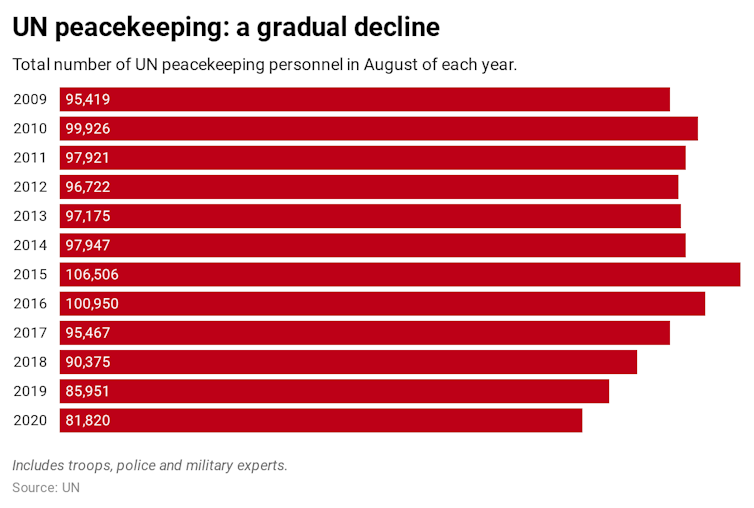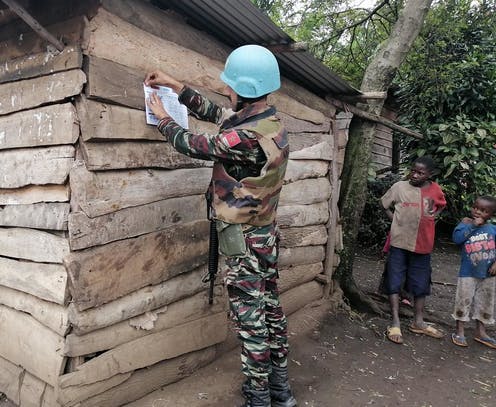As the world’s leaders and their diplomats prepare to meet for the 75th session of the UN general assembly, much of the discussion will be virtual – and dominated by the response to COVID-19.
When it comes to global peace and security, one of the UN’s core remits, coronavirus has had only a muted impact on peacekeeping operations. At the same time, longstanding calls to transform UN peacekeeping have made little progress.
The scale of UN peacekeeping was already in decline before coronavirus. And yet peacekeepers are a vital tool in the UN’s armoury to protect vulnerable people the world over.
Peace in the time of coronavirus
António Guterres, the UN secretary-general has also consistently defended the importance of UN peackeeping missions in light of the pandemic. In July, Guterres eventually secured a security council resolution that called for a general cessation of all hostilities around the world so an effective humanitarian response to the virus could be mounted for people caught up in conflict. But it took months to secure approval, and while 16 armed groups did initially pause fighting, it has resumed in some places, including Yemen and Libya, before the resolution passed.
The UN has also adapted how its missions to build and keep the peace operate on the ground. Rotation of troops has been limited, and the management of peacekeeeping missions have moved to working remotely whenever feasible. In the Central African Republic, South Sudan and the Democratic Republic of Congo, peacekeeping missions have strengthened the response of local authorities to COVID-19.
So far at least, peacekeepers are not considered responsible for spreading the virus – a particular concern for the UN given the recent history of inadvertently introducing cholera to Haiti. The UN may also have been lucky since, so far, COVID-19 has been less widespread in Africa, where most peacekeeping missions are deployed.
Read more:
‘They put a few coins in your hands to drop a baby in you’ – 265 stories of Haitian children abandoned by UN fathers
A mission in decline
At the same time, there is little evidence that coronavirus is transforming UN peacekeeping to make it part of an effective response to support the most vulnerable.
Action for Peacekeeping (A4P) – which was launched by the UN Secretary General in March 2018 – has remained the main framework to strengthen UN peacekeeping. Even though 154 countries, including the permanent members of the Security Council, have endorsed A4P and signalled their continued commitment to peacekeeping, the relevance of peacekeeping appears to be in decline.
In August 2020, the UN deployed 81,820 peacekeepers, a reduction by nearly 25% compared to the maximum deployment of 107,805 personnel in April 2015. At that time the UN had mandated 16 missions compared to 13 today. The last large multidimensional mission – MINUSCA to the Central African Republic – was mandated in 2014. UN peacekeeping missions could have been an option since then in Colombia, Ukraine and Syria, but did not happen.

UN Peacekeeping, CC BY
Instead, the UN has closed large peacekeeping missions to Haiti (2017), Côte d’Ivoire (2017) and Liberia (2018), replacing them with much smaller policing or political missions. It is taking a similar approach to the drawdown and planned closures of UNAMID in Sudan (Darfur) and MONUSCO in the Democratic Republic of the Congo.
The reduction in the number of large, multidimensional peacekeeping missions is in keeping with the emphasis in the A4P program on the need for political solutions to conflicts and political support for ongoing missions. In fact, over time the UN has developed a broad set of instruments – including political envoys, sanctions and political missions – in support of its peace and security mandate. As well as the 13 peacekeeping missions, it also has nine political ones.
Read more:
Why COVID-19 offers a chance to transform UN peacekeeping
Research I’ve done with colleagues shows how the number of diplomatic initiatives and civilian-led missions surpassed the number of peacekeeping missions since 2010. Using the full array of instruments may well be more cost-effective than relying on peacekeeping alone.
Hampered response
At the same time, the trend toward fewer and smaller missions reflects three main challenges to an effective global response to threats to peace and security.
First, the main global powers no longer agree that they share a collective responsibility to maintain global peace and stability. National interests increasingly determine their response to crises and civil wars, for example in the recent conflict in Libya.
Second, politicians but also the general public of potential host countries commonly express a lack of trust in foreign peacekeeping interventions. And third, UN agencies lack the necessary resources to sustain large-scale interventions.
The situation of civilians in conflict zones around the world remains precarious. They risk attacks from rebel factions and government forces. They had to worry about infectious diseases such as malaria, cholera, dengue and Ebola, even before COVID-19. The presence of a large peacekeeping mission can make a difference in the immediate aftermath to a crisis as shown after the Haiti earthquake in 2010 and Ebola in west Africa in 2013.
So far, fortunately, the worst fears about the effect of coronavirus on conflict-affected communities and refugee sites have not come true. However, as shown in Yemen, COVID-19 can worsen an already horrific situation. It also illustrates the limited means available to the UN to intervene effectively and to provide necessary humanitarian support.
![]()
Han Dorussen has received funding from the British Academy and currently receives funding from UKRI.











